Nada Ghosn
I strongly believe that people need to get angry for change to happen…As long as that anger doesn’t become a destructive force. —Alanoud Alsharekh
Her website declares “Arab women are the true measure of change in the region.” She’s not a household name but if you’re outspoken on women’s rights which are after all human rights, hers is a name you should know.
Educated in the US and the UK, Dr. Alanoud Alsharekh received her PhD in comparative feminism and Middle Eastern studies at the School of Oriental and African Studies (SOAS), University of London. She is a researcher, academic and activist focused on youth, gender, and Arab feminist theory. She’s an Associate Fellow in the Middle East and North Africa Programme at Chatham House and a research associate at the Arab Gulf States Institute in Washington. An outspoken advocate for women and minority rights in Kuwait, Alsharekh utilizes her voice as a member of Kuwait’s civil society and an academic to help facilitate public discussion about pivotal issues facing Arab society. She has published numerous books and articles focusing on political identity, cultural politics, gender and kinship policies in the Arabian Gulf.
Among her many accomplishments, Alsharekh is the director at Ibtkar Strategic Consultancy, a marketing and leadership initiative that emphasizes access to the Middle East and empowerment for women. She serves as an advisor to a number of local and international governmental bodies and NGOs. She has also lectured widely and held numerous teaching positions throughout her career, both in Kuwait and abroad. She is involved with a number of other non-profit organizations and civic civil society groups, including AIWF, Eithar and the Abolish 153 initiative under Ibtkar. She’s also the acting director of Friends who Care Campaign that seeks to help at risk young women under the age of 21 within Kuwait’s social care system.
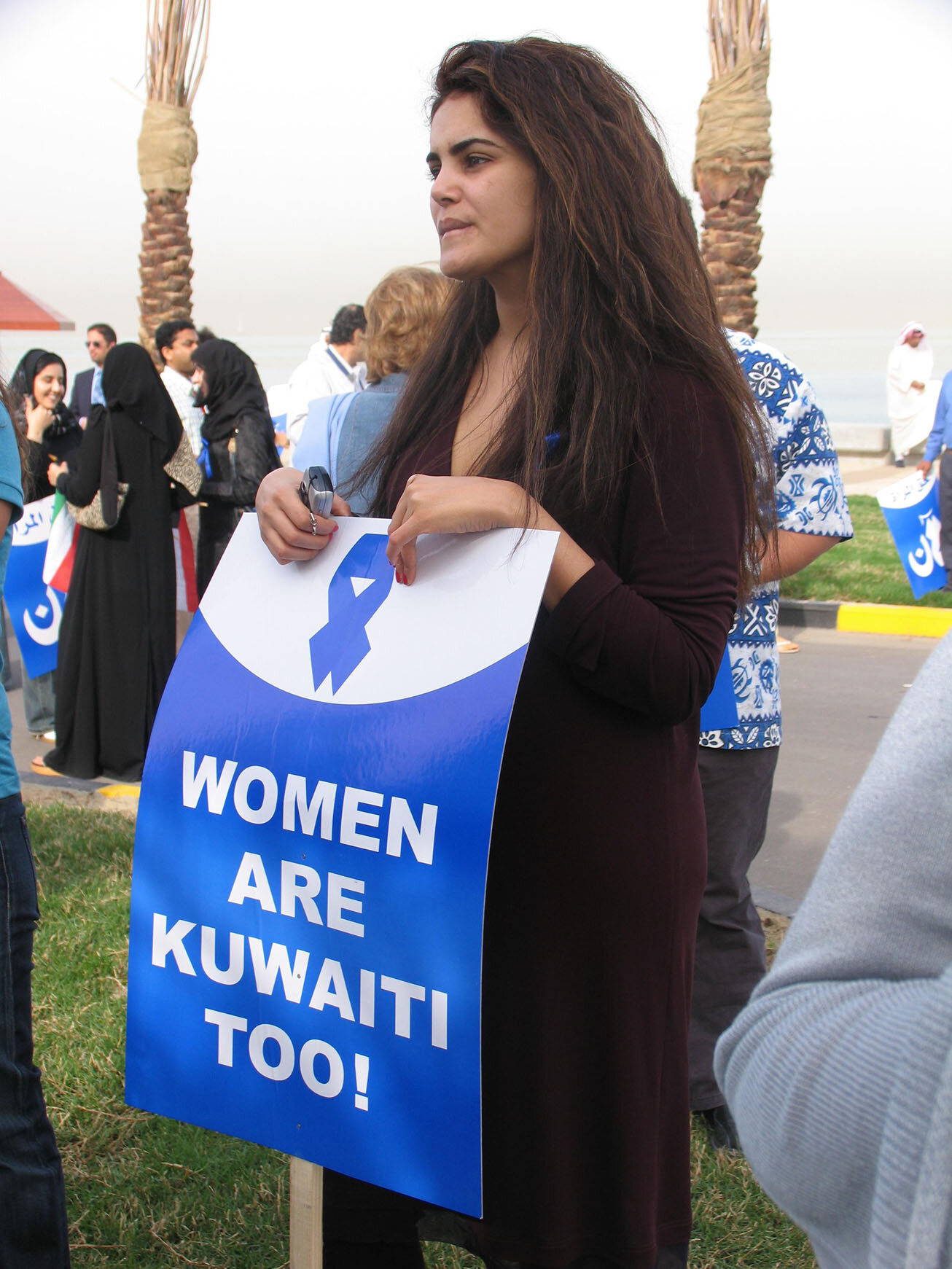
In 2016 Alsharekh was awarded a knighthood by the French Government (National Order of Merit) for her work promoting women’s rights in the region. She also received the Arab Prize for best publication in a foreign journal (2013-2014) by the Doha Institute in 2014, and won the Voices of Success Kuwait award in 2012. Because of her influence and ability to initiate change, she was chosen as one of the 100 most influential and inspiring women in the world by the BBC for 2019/2020.
Alanoud Alsharekh was kind enough to speak with me by phone from Kuwait City, where she lives with her Lebanese husband and her child. I was curious to discover this impressively active and productive woman, from a country we rarely hear about, but whose women have the reputation in the Arab world of being very strong and educated. She insisted that feminism in Kuwait remains under-documented. “I think in general, we ought to speak of feminism in the Arab Gulf states as khaliji feminism. I don’t think we can look at it independently just in Kuwait,” she says.
Kuwait became independent in the early sixties. It was the first country in the Arab region to have elections and a parliament. Despite the fact that Kuwait was a progressive state where women were educated, they were not included in power sharing. The demand to integrate women in the political process, however, appeared soon after independence, Alsharekh said.
With a population under five million, Kuwait has a very active civil society. NGOs began forming with the nascent independent state, and some were inherited from the time of the British protectorate. One of the oldest is the Women’s Cultural and Social Society, established in 1963. Alsharekh explains: “I think the progression of feminism in the Arab world, whether in North Africa, the Levant or the Arabian Gulf is intertwined with two things: post-independence struggles, and education for women.”
In Kuwait, mullah schools (organic village schools) were present in the 1910s and 1920s. They became more formalized in the 1930s during the British occupation, which was minor in Kuwait compared to other countries in the region. In the 1950s, with the influence of pan-Arab nationalism, Kuwaitis had to send their children to school by law.
Post-independence struggles in the Arab world, Alsharekh reminds us, included the demand of education for women. As a consequence, women’s aspiration to work and gain financial independence led to political and economical claims for integration. Bahrain and Kuwait were pioneers in this field in the Gulf region, although there weren’t any universities. The first group of women went to the university of Cairo in order to get post-secondary education in the fifties.
“But when they came back, these women decided that wearing an abaya [black dress and scarf] was hypocrisy. They weren’t criminalized, or penalized and the government didn’t stop their scholarships either,” Alsharekh explains. “I believe that feminist progression is an organic act. These first attempts were very ‘Arab’, and I don’t like when people say that feminists were influenced by the West! The desire to be treated like a human being is universal.”
In the 1990s, the Iraqi invasion of Kuwait provided a strong boost to feminist progression. During the occupation, a lot of women became martyrs and heroes. “We were allowed to give our lives but not to participate in the political process. Kuwait was the only Islamic democracy where women weren’t allowed to vote,” she says. “Because Kuwait was supported by international allies, there was international interest in why women weren’t also voting. So, after the liberation, many more demands emerged.”
When Iraq’s invasion of Kuwait started, Alsharekh’s parents sent her to a Lebanese school in England called Choueifat. From there she went on to London King’s College where she obtained a Bachelor’s in English literature, before moving to SOAS to get a Master’s degree in Applied Linguistics and English-Arabic Translation. “In between, I got married and pregnant, so, when I finished my Master’s, I came back to teach at Kuwait University. Around the same time, in 1999, a bill had been introduced to Parliament. It was supposed to get women their political right to vote. But we lost. There were men who clapped! They were so happy about these results,” she relates.
I am not going to step back and watch my daughter getting marginalized, like I was or my mother was!
At the time, Alsharekh decided to return to SOAS to do her PhD on comparative literature and the emergence of feminist awareness. “Is it a matter of culture, religion, or gender? It is most definitely the latter! Women are marginalized and not given equal opportunities all over the world, for different justifications,” she thought. She chose the literary approach, as it includes both cultural and political aspects of human life. She wanted to track how awareness in a place like England intersected with activism along a historical timeline, as suffrage developed and law changed.
“I wanted to understand how all this was reflected in women’s writings. And how, when I compared it to different parts of the Arab world, it would display different stages of awareness.” She focused therefore on three Arab writers: Laila Al Othman from Kuwait, Nawal El-Saadawi from Egypt, and Hanan Al-Shaykh from Lebanon. “It’s interesting to see that all these women are contemporary, more or less. Because feminism is a global movement, wherever you live in the world, you can be influenced by what’s happening.”
After completing her PhD, she was recruited by Uppsala University in Sweden. She taught feminist literature in the Arab world, and also had a class about symbols in the modern literature of the Arabian Gulf. “The Swedish don’t try to tell you what your culture is. Maybe because they don’t have a colonial history with our countries. It happened that I met Middle Eastern researchers who tried to tell me what my culture is,” notes Alsharekh. “At that time my classes were prepared for Western audiences, and I thought that was the best way to break stereotypes about Arab women.”
Following this, she went back to Kuwait to teach at the Arab Open University where she was appointed head of the English Language Department, then the head of the Socio-linguistic Department for all six countries where the University had campuses. On April 25, 2005, she was hosted by Zeina Badawi’s BBC special program about women in the Arab world. “Women’s vote is inevitable,” she declared… And they got the vote passed in Parliament a month later.
She wanted to document and archive this moment in history, taking and collecting photos of the protests, and decided to stop teaching. Following this, her government asked Alsharekh to represent Kuwait in the Francophone group that at the time was invited to France by the French Ministry of Foreign Affairs.
What struck me about those French political women at that time is that they didn’t have to wear a power suit! They still could be women, and play a powerful role. This is how I saw them and I got inspired.
When she came back, she focused on research and got two grants. One of them was to list all the laws that discriminated against women. “I strongly believe that people need to get angry for change to happen… As long as that anger doesn’t become a destructive force. We can be soft but angry.” As a play on the typical expression “softer sex,” Angry words, Softly Spoken! — in Arabic Al Ghadab Ennaem —was the title of her first book, an anthology published in 2006.
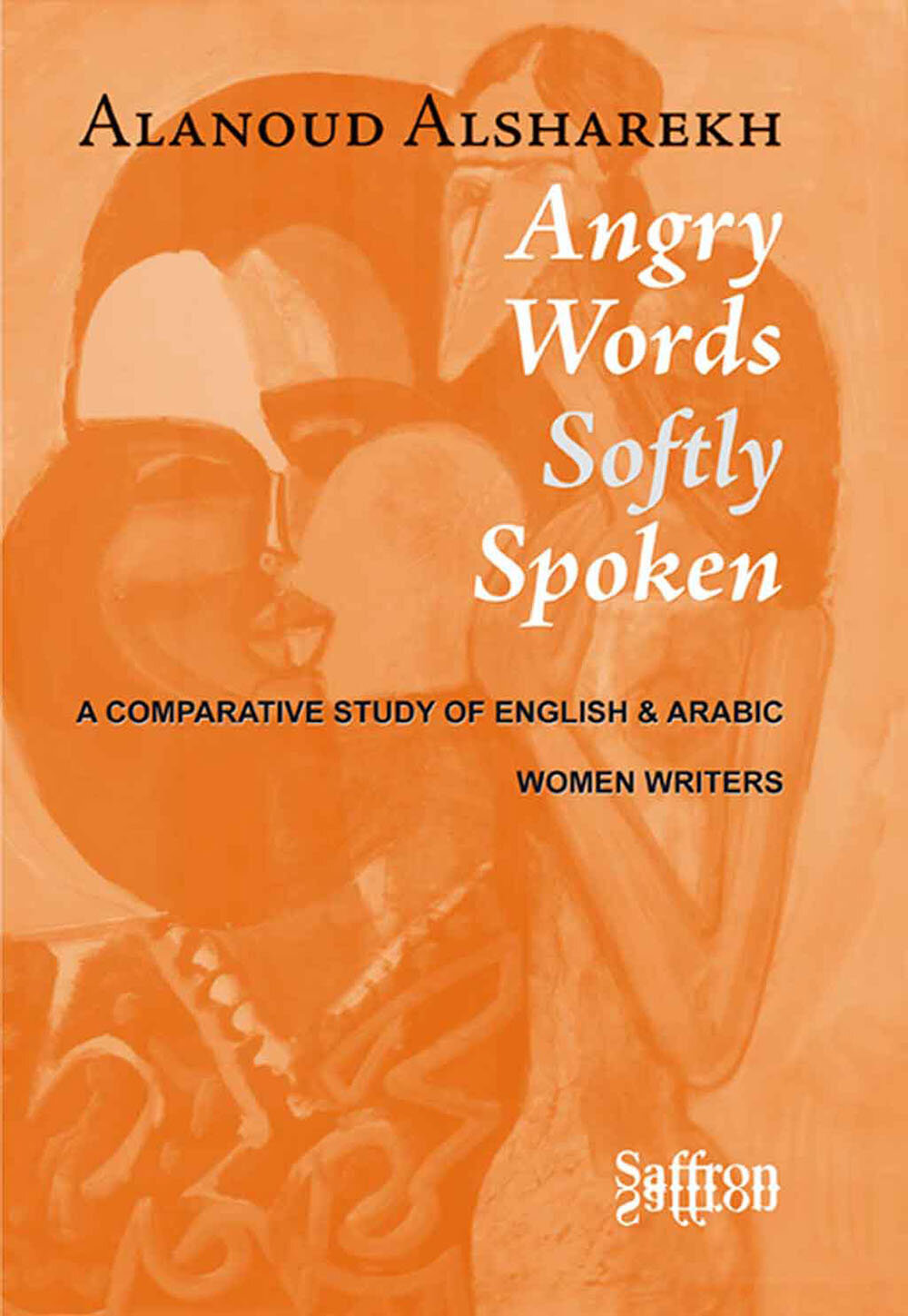
Following this, Al Sharekh was recruited by the National Security Bureau in Kuwait to work on human rights with outside entities. She also became a Fulbright scholar, and went to teach in California. During her class about women, Islam and contemporary issues, some students had a surprising reaction to her approach: “‘She doesn’t look Muslim, she doesn’t talk Muslim, I don’t know what she’s selling, but I am not buying it!'”
That same year, Georges W. Bush did a Middle East tour. When he came to Kuwait, he asked to meet with 10 women leaders. “I was one of them. Those women were successful and strong; they were activists and former ministers. At the end of our meeting, he looked at us and said: ‘They told me you all are oppressed, you don’t look at all oppressed to me!'”
After that, Alsharekh went to work for the International Institute on Strategic Studies, a think tank for security and strategy issues. While she was in the US, the Arab Spring started. The Arab Woman Revolution “Thawrat Al Mara’a Al ‘Arabiya” was happening on Twitter and Facebook. “At the time, I was giving conferences at SOAS, and when people spoke about the Gulf, they spoke only about petrodollars or terrorism,” she remembers.
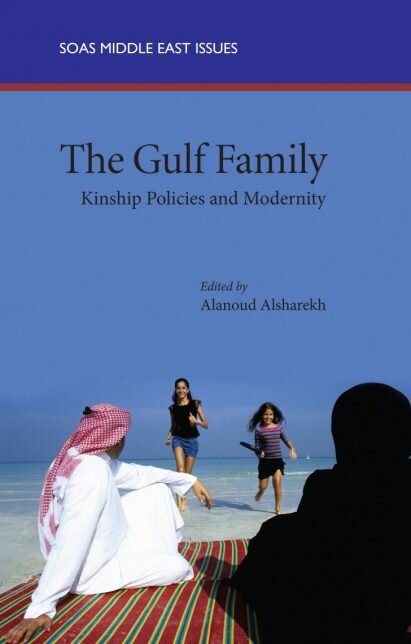
With her work at SOAS, she looked at changing the roles of women in the Gulf. She published her second book, The Gulf Family: Kinship Policies and Modernity (2007), consisting of academic research about families in the Gulf: the ruling families, the merchant families who controlled the private sector, and the tribes who really influenced elections. “When you think of family, it’s not just in the nuclear sense like in the West. The course of the family is intertwined in our identity, politics and economics,” she explains.
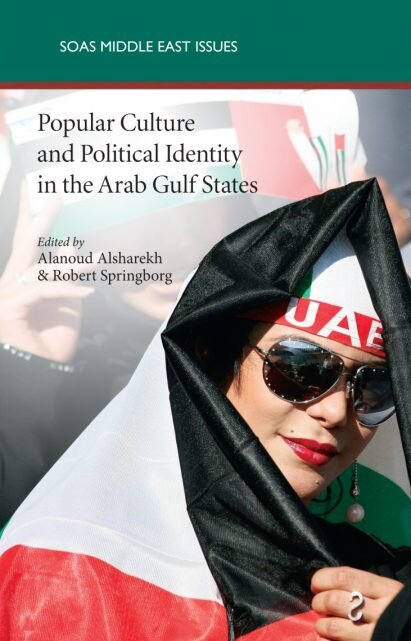
In 2008 Alsharekh published a third book in this series, out from SOAS and Saqi with co-editor Robert Springborg, entitled Popular and Political Cultures of the Arabian Gulf, that explored “the new dynamism of the Gulf, reflected not just in high-rise buildings and booming stock markets, but also manifested in the realms of art, ideas and expression, and their relationships with political authority.”
By 2016 she had left the government and become an Associate Fellow at Chatham House. But more importantly, she started her own consultancy called Ibtkar—in Arabic “innovation”—focusing on diversity, inclusion, and empowering youth and women. “For instance, because we have upcoming elections this month, I’ve been trying to help a lot of women candidates to translate their campaigns online. It’s usually difficult for them to get voters, and now it’s even more difficult with Covid-19.” All of those programs are given without any fees. Once they get sponsorships to do them, they open them up to the public.
From 2006, Alsharekh was trying to raise awareness on the issue of honor killing in Kuwait. “I was horrified to discover that Kuwait has an honor killing law, and that is Article 153 of our penal code.” To combat honor killing, she launched the Abolish 153 campaign. Mothers, daughters, sisters or wives can be killed in an act of zeena’ and it’s not considered a crime. The maximum punishment is three years in jail or a fine. The campaign also focuses on the idea of disciplinary violence “Al ‘Unf Al Ta’dibi”, which is very common, not only in the Gulf, but also in Central Asia and other places.
I think calling it a ‘honor crime’ is orientalist. In the West it’s called ‘a murder.’ Not naming the problem is also the problem. Of course, in Kuwait laws are derived from Napoleonic code. This used to be a crime of passion, but Kuwaitis removed the wives, and made it just the right of the husband. And they added to the wife: mother, daughter and sister.
In addition, Alsharekh points to the absence of shelters for women victims of violence. A shelter exists, she says, but it’s not yet functional. Abolish 153 helps these women, putting them in touch with lawyers and doctors. More generally, the campaign works on raising awareness in the Gulf and trains victim advocates on how to foster strong grassroots movements. “This struggle costs us and our families a lot. The risk is very high for feminists, even though we’re not interested in controversy but collaboration,” she says. “However, after years of work, everybody talks about Abolish 153! We slowly forced this conversation into the mainstream.”
Recently, five members of Parliament signed a bill to abolish law 153. Parliament still hasn’t voted on it, but it’s in chambers. “In recent months we were fighting for them to pass a domestic violence law, because as you know, with Covid-19, abuse has gone through the roof! It took years to come to a vote, and finally this August it was passed! You know, when they tried to pass the children protection law, it took 10 years to be approved. It was viewed as an intrusion in the domestic space. The idea of guardianship is the biggest issue we’re currently dealing with in Kuwait. For example, a woman can’t sign a paper at the hospital, and if you want to get married and your father says no, you go to court,” she says.
“I don’t want to be a member of Parliament or a politician, because I’m not willing to compromise. I think of myself as a cheerleader whose cause is to resolve the issue of violence in Kuwait. I’m free doing this, lobbying, running an NGO and consultancy. We want to push the law as much as we can. That’s why we collaborate with such associations in Turkey, Lebanon or Jordan, but also MPs and women activists in the region, as well as such associations in Turkey, Lebanon or Jordan. Because we don’t live in exile. We live in our countries, and we want to make a difference in our countries. Like Simone de Beauvoir said, any of our rights would be taken back and regressed if we don’t fight.”
Dr. Alanoud Alsharekh’s new book will come out in a few months: Tribalism and Political Power in the Gulf examines how tribalism has evolved in the Gulf super-rentier states, and especially how it intersects with, and defines at times, political expression.



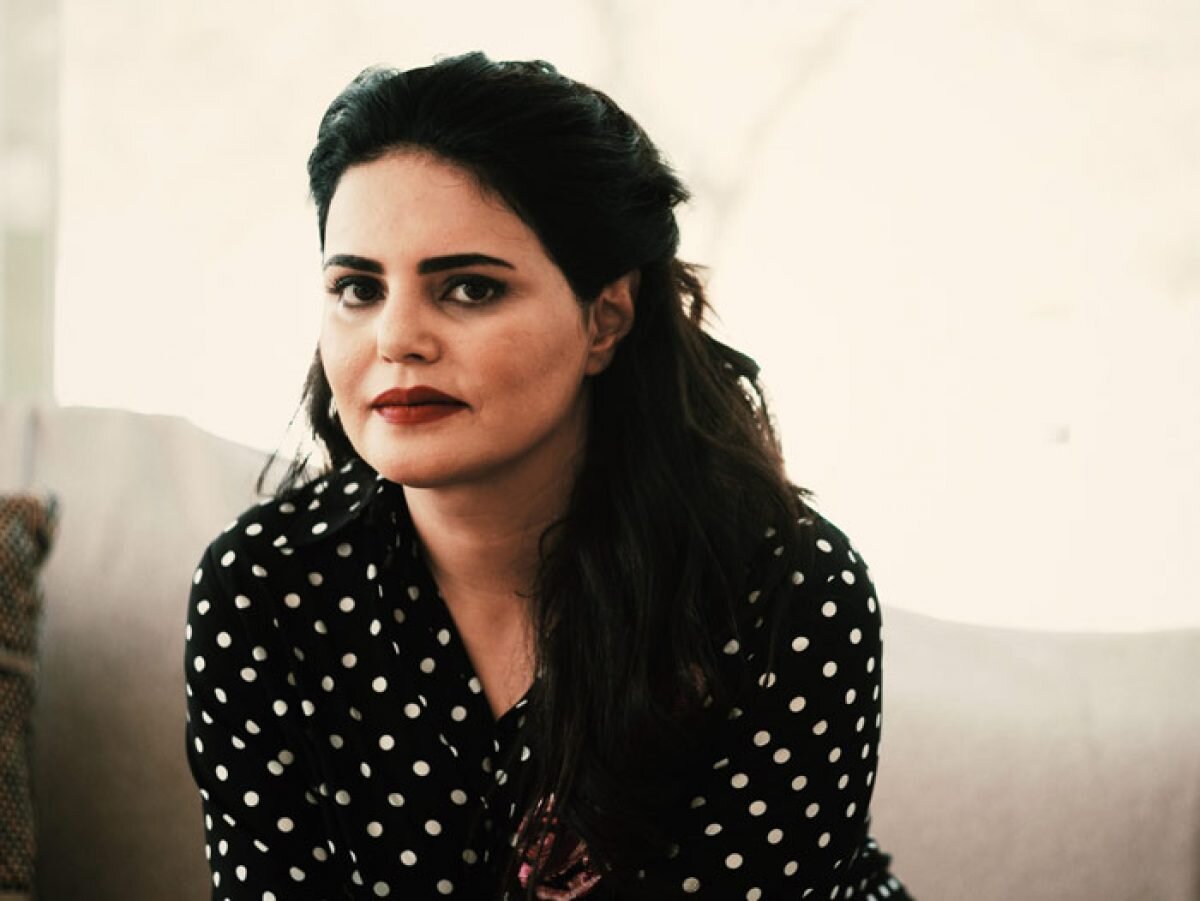

A brave warrior. I had not heard of her.